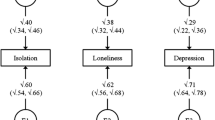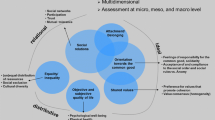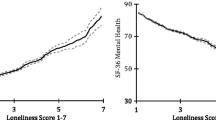Abstract
This study examined how social capital in ethnic communities (e.g., social cohesion, community support, community participation, and negative interaction) influences depressive symptoms of older Korean immigrants. Using survey data from 209 participants in Central Texas (M age = 69.6, SD = 7.50), hierarchical regression models of depressive symptoms were examined with the following sets of predictors: (1) demographics, (2) physical health, (3) sociocultural factors, and (4) ethnic community factors. After controlling for the multiple sets of individual-level variables previously known to be important predictors of mental health, ethnic community factors made a substantial contribution. Higher levels of depressive symptoms were observed among individuals who received lower levels of community support (β = −0.14, p < 0.05), had limited participation in ethnic community events and activities (β = −0.15, p < 0.05), and reported more frequent negative interactions with ethnic community members (β = 0.12, p < 0.05). Findings highlight the importance of social capital in ethnic communities and hold implications for improving older ethnic immigrants’ mental well-being.
Similar content being viewed by others
Notes
Due to the small number of individuals who were divorced or never married (less than 5 % of the total sample), marital status was dichotomized (married or unmarried). About 12 % of the sample was living alone. Living arrangement was highly correlated with marital status (r = 0.59, p < 0.001); therefore, it was not included in the analysis.
References
Alegria, M., Takeuchi, D., Canino, G., Duan, N., Shrout, P., Meng, X. L., et al. (2004). Considering context, place and culture: The National Latino and Asian American Study. International Journal of Methods in Psychiatric Research, 13(4), 208–220.
Andresen, E. M., Malmgren, J. A., Carter, W. B., & Patrick, D. L. (1994). Screening for depression in well older adults: evaluation of a short form of the CES-D. American Journal of Preventive Medicine, 10(2), 77–84.
Berkman, L. F., Berkman, C. S., Kasl, S., Freeman, D. H., Leo, L., Ostfeld, A. M., et al. (1986). Depressive symptoms in relation to physical health and functioning in the elderly. American Journal of Epidemiology, 124(3), 372–388.
Bjornstrom, E. S., Ralston, M., & Kuhl, D. (2013). Social cohesion and self-rated health: the moderating effect of neighborhood physical disorder. American Journal of Community Psychology, 52(3–4), 302–312.
Blazer, D. G., Landerman, L. R., Hays, J. C., Simonsick, E. M., & Saunders, W. B. (1998). Symptoms of depression among community-dwelling elderly African-American and White older adults. Psychological Medicine, 28(06), 1311–1320.
Bourdieu, P. (1986). The forms of capital. In J. G. Richardson (Ed.), Handbook of theory and research for the sociology of education (pp. 241–258). New York: Greenwood.
Cagney, K. A., Glass, T. A., Skarupski, K. A., Barnes, L. L., Schwartz, B. S., & de Leon, C. F. M. (2009). Neighborhood-level cohesion and disorder: measurement and validation in two older adult urban populations. The Journals of Gerontology Series B: Psychological Sciences and Social Sciences, 64(3), 415–424.
Chau, S., & Lai, D. W. (2011). The size of an ethno-cultural community as a social determinant of health for Chinese seniors. Journal of Immigrant and Minority Health, 13(6), 1090–1098.
Cheong, P. H., Edwards, R., Goulbourne, H., & Solomos, J. (2007). Immigration, social cohesion and social capital: a critical review. Critical Social Policy, 27(1), 24–49.
Cho, M. J., Nam, J. J., & Suh, G. H. (1998). Prevalence of symptoms of depression in a nationwide sample of Korean adults. Psychiatry Research, 81(3), 341–352.
Cohen, S., & Wills, T. A. (1985). Stress, social support, and the buffering hypothesis. Psychological Bulletin, 98(2), 310–357.
Cohen, J., Cohen, P., West, S. G., & Aiken, L. S. (2003). Applied multiple regression/correlation analysis for the behavioral sciences (3rd ed.). Mahwah: Lawrence Erlbaum.
Coleman, J. S. (1988). Social capital in the creation of human capital. American Journal of Sociology, 94, S95–S120.
Evergeti, V., & Zontini, E. (2006). Introduction: some critical reflections on social capital, migration and transnational families. Ethnic and Racial Studies, 29(6), 1025–1039.
Fillenbaum, G. (1988). Multidimensional functional assessment: the Duke older Americans resources and services procedure. Hillsdale: Lawrence Erlbaum.
Gee, G. C., Spencer, M. S., Chen, J., Yip, T., & Takeuchi, D. T. (2007). The association between self-reported racial discrimination and 12-month DSM-IV mental disorders among Asian Americans nationwide. Social Science and Medicine, 64(10), 1984–1996.
Glass, T. A., De Leon, C. F. M., Bassuk, S. S., & Berkman, L. F. (2006). Social engagement and depressive symptoms in late life: longitudinal findings. Journal of Aging and Health, 18(4), 604–628.
Gonzalez, H. M., Haan, M. N., & Hinton, L. (2001). Acculturation and the prevalence of depression in older Mexican Americans: baseline results of the Sacramento area Latino study on aging. Journal of the American Geriatrics Society, 49(7), 948–953.
Gray, A. (2009). The social capital of older people. Ageing and Society, 29(01), 5–31.
Guo, M., Li, S., Liu, J., & Sun, F. (2014). Family relations, social connections, and mental health among Latino and Asian older adults. Research on Aging. doi:10.1177/0164027514523298.
Hong, M., Casado, B. L., & Harrington, D. (2011). Validation of Korean versions of the Lubben Social Network Scales in Korean Americans. Clinical Gerontologist, 34(4), 319–334.
Jang, Y., & Chiriboga, D. A. (2010). Living in a different world: acculturative stress among Korean American elders. The Journals of Gerontology Series B: Psychological Sciences and Social Sciences, 65b(1), 14–21.
Jang, Y., Kim, G., Chiriboga, D., & King-Kallimanis, B. (2007). A bidimensional model of acculturation for Korean American older adults. Journal of Aging Studies, 21(3), 267–275.
Kao, G. (2004). Social capital and its relevance to minority and immigrant populations. Sociology of Education, 77(2), 172–175.
Kauh, T. O. (1997). Intergenerational relations: older Korean-Americans’ experiences. Journal of Cross-Cultural Gerontology, 12(3), 245–271.
Kawachi, I., & Berkman, L. (2000). Social cohesion, social capital, and health. In L. Berkman & I. Kawachi (Eds.), Social epidemiology (pp. 174–190). New York: Oxford University Press.
Kawachi, I., Subramanian, S. V., & Kim, D. (2008). Social capital and health: a decade of progress and beyond. In I. Kawachi, S. V. Subramanian, & D. Kim (Eds.), Social capital and health (pp. 1–26). New York: Springer.
Kim, B. J., Auh, E., Lee, Y. J., & Ahn, J. H. (2013). Impact of social capital on depression among older Korean and Chinese immigrants: similarities and differences. Aging and Mental Health, 17(7), 844–852.
Lincoln, K. D. (2013). Social relationships and health among minority older adults. In T. A. Baker & K. E. Whitfield (Eds.), Handbook of minority aging (pp. 25–46). New York: Springer.
Lochner, K. A., Kawachi, I., Brennan, R. T., & Buka, S. L. (2003). Social capital and neighborhood mortality rates in Chicago. Social Science and Medicine, 56(8), 1797–1805.
Lubben, J. E. (1988). Assessing social networks among elderly populations. Family & Community Health, 11(3), 42–52.
Min, J. W., Moon, A., & Lubben, J. E. (2005). Determinants of psychological distress over time among older Korean immigrants and Non-Hispanic White elders: evidence from a two-wave panel study. Aging & Mental Health, 9(3), 210–222.
Mulvaney-Day, N. E., Alegria, M., & Sribney, W. (2007). Social cohesion, social support, and health among Latinos in the United States. Social Science and Medicine, 64(2), 477–495.
National Alliance on Mental Illness (2011). Asian-American and Pacific Islander mental health. Retrieved from http://www.nami.org/Template.cfm?Section=Multicultural_Support1&Template=/ContentManagement/ ContentDisplay.cfm&ContentID=115281.
Noh, S., & Kaspar, V. (2003). Perceived discrimination and depression: moderating effects of coping, acculturation, and ethnic support. American Journal of Public Health, 93(2), 232–238.
Noh, S., Avison, W. R., & Kaspar, V. (1992). Depressive symptoms among Korean immigrants: assessment of a translation of the Center for Epidemiologic Studies-Depression Scale. Psychological Assessment, 4(1), 84–91.
Nyqvist, F., Gustavsson, J., & Gustafsson, Y. (2006). Social capital and health in the oldest old: the Umeå 85+ study. International Journal of Ageing and Later Life, 1(1), 91–114.
Park, N. S., Jang, Y., Lee, B. S., Ko, J. E., Haley, W. E., & Chiriboga, D. A. (2015). An empirical typology of social networks and its association with physical and mental health: a study with older Korean immigrants. The Journals of Gerontology Series B: Psychological Sciences and Social Sciences, 70(1), 67–76.
Portes, A. (1998). Social capital: its origins and applications in modern sociology. Annual Review of Sociology, 24(1), 1–24.
Putnam, R. (1993). The prosperous community: Social capital and public life. The American Prospect, 13(Spring), Available online: http://epn.org/prospect/13/13putn.html.
Radloff, L. S. (1977). The CES-D scale a self-report depression scale for research in the general population. Applied Psychological Measurement, 1(3), 385–401.
Ryan, L., Sales, R., Tilki, M., & Siara, B. (2008). Social networks, social support and social capital: the experiences of recent Polish migrants in London. Sociology, 42(4), 672–690.
Sneed, R. S., & Cohen, S. (2014). Negative social interactions and incident hypertension among older adults. Health Psychology, 33(6), 554–565. doi:10.1037/hea0000057.
Turner, J. B., & Turner, R. J. (2013). Social relations, social integration, and social support. In C. S. Aneshensel, J. C. Phelan, & A. Bierman (Eds.), Handbook of the sociology of mental health (pp. 341–356). New York: Springer.
U.S. Census Bureau (2012). The Asian population: 2010. Retrieved from www.census.gov/prod/cen2010/briefs/c2010br-11.pdf.
Wong, S. T., Yoo, G. J., & Stewart, A. L. (2007). An empirical evaluation of social support and psychological well-being in older Chinese and Korean immigrants. Ethnicity and Health, 12(1), 43–67.
Acknowledgments
This work was supported by the St. David’s Center for Health Promotion and Disease Prevention Research (CHPR) Pilot Grant Program (#30-2142-4351, PI-Yuri Jang, PhD).
Author information
Authors and Affiliations
Corresponding author
Rights and permissions
About this article
Cite this article
Jang, Y., Park, N.S., Chiriboga, D.A. et al. Social Capital in Ethnic Communities and Mental Health: A Study of Older Korean Immigrants. J Cross Cult Gerontol 30, 131–141 (2015). https://doi.org/10.1007/s10823-015-9258-9
Published:
Issue Date:
DOI: https://doi.org/10.1007/s10823-015-9258-9




